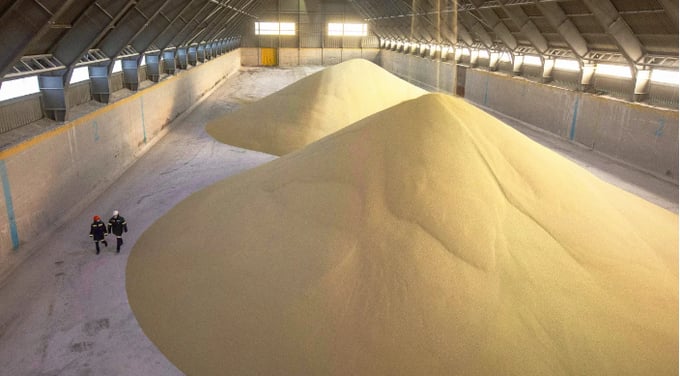June 11, 2025 | 15:28 GMT +7
June 11, 2025 | 15:28 GMT +7
Hotline: 0913.378.918
June 11, 2025 | 15:28 GMT +7
Hotline: 0913.378.918

Piles of phosphate fertilizer granules in a storage warehouse at a fertilizer plant in Cherepovets, Russia. Photo: Andrey Rudakov/Bloomberg/Getty Images
“We agree that the barriers to Russian grain and exports should also be removed. We support efforts to remove these barriers,” Çavuşoğlu said at a joint press conference with his Russian counterpart, Sergey Lavrov.
There is an understanding between the U.N. and Russia to ensure the export of Russian grain, fertilizers and ammonia, Çavuşoğlu reminded and said that “the agreements reached must be implemented” for continuing the Black Sea Grain deal.
The U.S. and the U.K. have taken some steps on the issue of payments, but the problem still persists, he added.
Lavrov, for his part, said Russia was excluded from the swift payment system and the Russian vessels cannot enter the ports, although neither fertilizer nor grain was on the sanction lists of the West against Russia.
The Russian minister warned that Moscow will question another extension of the grain deal if no further progress is achieved in removing obstacles to the export of Russian fertilizers and grain.
Having extended the deal for a second period of 120 days and “not finding any signs that someone can really solve these issues, weary of the conscience of those on whom it depends, we went for a slight escalation and welcome the resumption of this offensive only for 60 days,” he said.
“If there are no further benefits in removing obstacles to the export of products, we will consider whether this deal is necessary,” he added.
If necessary, Russia will work outside the framework of this initiative and “do this with Türkiye and with Qatar,” Lavrov noted.
Moscow wants any Ukraine peace talks to focus on creating a “new world order,” the Russian minister also said. “Any negotiation needs to be based on taking into account Russian interests, Russian concerns… It should be about the principles on which the new world order will be based,” he emphasized. Russia rejects a “unipolar world order led by ‘one hegemon,’” he added.
On the issue of the normalization process between Türkiye and Syria, Çavuşoğlu said Ankara hopes dialogue on Syria will continue in a “transparent and open” manner. “We will continue to be in close consultation with Russia for the normalization process with Syria,” he said.
“We know that not all issues can be settled in one meeting, in two meetings, we are realistic. We want this process to continue in a transparent manner. The dialogue needs to continue, it would be beneficial to continue the consultations by intensifying,” he said.
Çavuşoğlu also noted that they discussed the upcoming quadrilateral foreign ministers’ meeting, including Iran and Syria.
Asked about the election process in Türkiye, Lavrov said Russia never interferes in the internal affairs of other countries.
(SF)

(VAN) As of Friday, a salmonella outbreak linked to a California egg producer had sickened at least 79 people. Of the infected people, 21 hospitalizations were reported, U.S. health officials said.

(VAN) With the war ongoing, many Ukrainian farmers and rural farming families face limited access to their land due to mines and lack the financial resources to purchase needed agricultural inputs.

(VAN) Vikas Rambal has quietly built a $5 billion business empire in manufacturing, property and solar, and catapulted onto the Rich List.

(VAN) Available cropland now at less than five percent, according to latest geospatial assessment from FAO and UNOSAT.

(VAN) Alt Carbon has raised $12 million in a seed round as it plans to scale its carbon dioxide removal work in the South Asian nation.

(VAN) Attempts to bring down the price of the Japanese staple have had little effect amid a cost-of-living crisis.

(VAN) Fourth most important food crop in peril as Latin America and Caribbean suffer from slow-onset climate disaster.